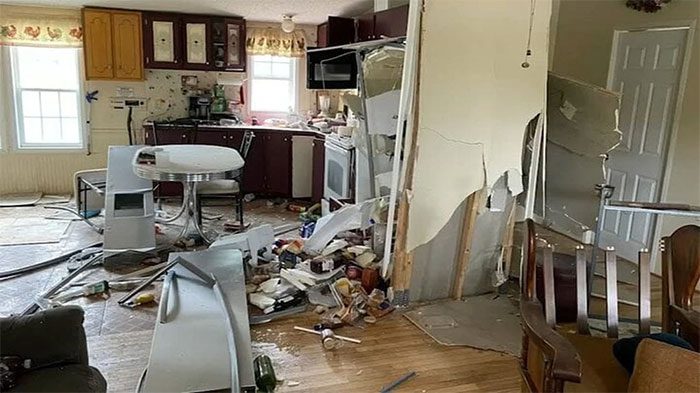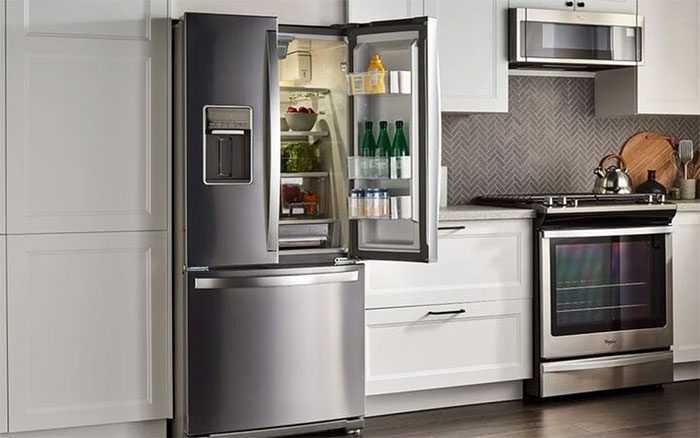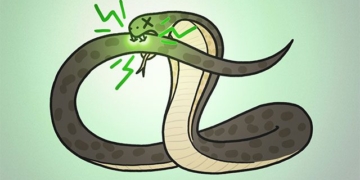Refrigerators Can Unexpectedly Explode Without Warning: Why Does This Happen?
Many people are unaware that refrigerators can be considered dangerous household appliances. While most electronic devices give off smoke or alarms before exploding, refrigerators can explode unexpectedly without any warning signs, leaving users unable to react in time. Numerous incidents of refrigerators exploding like bombs have resulted in damage to both people and property.
In April 2023, an incident occurred in Person County, North Carolina (USA). While working in the living room, Ms. Lenore Satterthwaite heard a loud explosion resembling an earthquake coming from the kitchen. Upon investigating, she found that her newly purchased refrigerator, not even a year old, had exploded, leaving large holes in the wall and kitchen items scattered everywhere.

Ms. Lenore Satterthwaite’s kitchen after the refrigerator explosion. (Photo: Cbsnews).
Local authorities investigated and concluded that the cause of the explosion was not an electrical short but rather a potential issue with the cooling system.
To prevent unforeseen risks, it’s essential to understand the reasons why refrigerators can explode. This knowledge can help you avoid such accidents in your home.
Reasons Why Refrigerators Can Explode
The explosion of a refrigerator is a dangerous situation that can arise if you do not use and maintain the appliance safely. The causes include:
Gas Leaks
The gas cylinder in the refrigerator is protected by a sturdy casing. However, improper gas refilling or repairs can lead to gas leaks. Gas can escape from weak points, creating a hazardous environment. If the leaking gas comes into contact with sparks or heat sources, it can lead to an explosion.
Refrigerant Leaks
Many freezers often develop ice or frost buildup over time. Users may attempt to chip away at this ice with hard, sharp objects, which can accidentally damage the freezer’s walls and result in refrigerant leaks, increasing the risk of explosion.
Storing Carbonated Beverages in the Freezer
On hot days, many people place carbonated beverages in the freezer to keep them cool. This can lead to explosions in the refrigerator.
Carbonated drinks are stored in cans at temperatures below 0°C. Under these conditions, the solubility of carbon dioxide (CO2) in the liquid changes, causing CO2 to start releasing, which increases pressure inside the can. If the pressure suddenly exceeds the can’s tolerance, it will explode.
Storing Flammable Materials in the Refrigerator
Similar to carbonated drinks, storing alcohol, beer, and other flammable substances in the freezer can create an environment of increased pressure. These flammable materials contain compounds that can evaporate at low temperatures.
If the pressure inside the freezer rises suddenly, the flammable materials could lead to an explosion.

Various causes of refrigerator explosions. (Photo: Whirlpool)
Placing the Refrigerator Near Heat Sources
Positioning the refrigerator too close to heat sources such as gas stoves, microwaves, and cooking appliances can create dangerous situations. These devices produce high temperatures during operation and can raise the temperature inside the refrigerator if placed too close, leading to increased pressure and potential explosions.
Old Refrigerators
Older refrigerators often undergo wear and tear over time. Internal components such as compressors, gas cylinders, cooling systems, and other parts may have deteriorated or become damaged.
If a refrigerator is too old and not properly maintained, the internal pressure can increase abruptly, which is one of the reasons why a refrigerator can explode.
Prevention Measures
Most refrigerator explosions occur unexpectedly and without clear warning signs. To minimize the risk of a refrigerator fire or explosion, you should choose an appropriate location for the refrigerator, avoiding placement in cramped spaces, against walls, or in overly damp areas.
The back of the refrigerator needs space for heat dissipation. Additionally, keep the refrigerator away from flammable items and avoid using sharp objects to clean ice in the freezer.
Furthermore, pay attention to the sounds your refrigerator makes. Normally, the compressor operates with a consistent, high-pitched buzzing sound. However, if the refrigerator emits a loud, unusual noise, or worse, is completely silent, the refrigerant lines may be blocked. In this case, you should unplug the appliance and call a technician to inspect and clean the condenser coils.
If the refrigerator is too old, consider replacing it to ensure safe usage.



















































